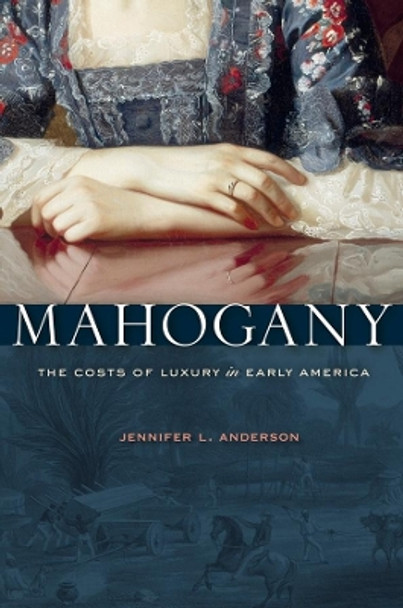Description
In the mid-eighteenth century, colonial Americans became enamored with the rich colors and silky surface of mahogany. This exotic wood, imported from the West Indies and Central America, quickly displaced local furniture woods as the height of fashion. Over the next century, consumer demand for mahogany set in motion elaborate schemes to secure the trees and transform their rough-hewn logs into exquisite objects. But beneath the polished gleam of this furniture lies a darker, hidden story of human and environmental exploitation.
Mahogany traces the path of this wood through many hands, from source to sale: from the enslaved African woodcutters, including skilled "huntsmen" who located the elusive trees amidst dense rainforest, to the ship captains, merchants, and timber dealers who scrambled after the best logs, to the skilled cabinetmakers who crafted the wood, and with it the tastes and aspirations of their diverse clientele. As the trees became scarce, however, the search for new sources led to expanded slave labor, vicious competition, and intense international conflicts over this diminishing natural resource. When nineteenth-century American furniture makers turned to other materials, surviving mahogany objects were revalued as antiques evocative of the nation's past.
Jennifer Anderson offers a dynamic portrait of the many players, locales, and motivations that drove the voracious quest for mahogany to adorn American parlors and dining rooms. This complex story reveals the cultural, economic, and environmental costs of America's growing self-confidence and prosperity, and how desire shaped not just people's lives but the natural world.
About the Author
Jennifer L. Anderson is Associate Professor of History at the State University of New York at Stony Brook.
Reviews
[A] fascinating book about the most coveted wood in early America and, indeed, the 18th-century British Empire... This enlightening...study does for mahogany what others long ago did for sugar and tobacco, chocolate and coffee, rubber and bananas... From an impressive number of archival sources [Anderson] has assembled a vibrant collective portrait of colonial grandees-Benjamin and William Franklin, among them-declaring their social dominance through hard-won mahogany possessions. -- Kirk Davis Swinehart * Wall Street Journal *
Anderson details the history of the search for, trade in, and use of mahogany. Though the title directs readers to early America, for Anderson, America is in reality the Atlantic world. Most of the author's time is spent among the islands of the Caribbean or near the Bay of Honduras in Belize, where mahogany was harvested. Anderson paints a picture of the Atlantic world in which travel and trade were the norm and families lived and worked up and down the coasts of North and Central America as well as on numerous Caribbean islands. -- S. A. Jacobe * Choice *
From the 1720s to the mid-19th century, mahogany was the preeminent medium for conspicuous consumption on both sides of the Atlantic... However, as Anderson's superb [book] makes abundantly clear, the polished luster of these immaculate objects came from exploitative labor practices, ecological devastation, and phenomenal business failures, all of which attested to the commodity's natural and human cost... Anderson's is a remarkable contribution to Atlantic history that...will be much enjoyed by anyone interested in the history of trade in colonial America and the Caribbean. -- Brian Odom * Library Journal *
Anderson's evocative and stunning Mahogany reminds us of both the deep ties between humans and trees and the sharp consequences of allowing our passion for beauty to trump nature's capacity to sustain a species. -- Peter C. Mancall, author of Fatal Journey: The Final Expedition of Henry Hudson
Anderson has crafted a rich blend of the cultural history of mahogany, the social history of logging, the economic history of the mahogany timber trade, the environmental history of Caribbean forests, and the history of the natural history of mahogany. The result is an elegant essay in Atlantic history. -- J. R. McNeill, author of Mosquito Empires: Ecology and War in the Greater Caribbean, 1620-1914
This superb study of a vital early American commodity focuses on its production, distribution, and consumption from the age of sail to the era of steam. Mahogany's sumptuousness came at a severe price, somewhat offset by enhanced knowledge of its properties and opportunities in its harvesting. With its highly nuanced and sophisticated argument, this book deserves a wide readership. -- Philip Morgan, author of Slave Counterpoint: Black Culture in the Eighteenth-Century Chesapeake and Lowcountry
'When you drink the water, think of the well-digger,' is folk wisdom around the world. Anderson wisely adds, when you see elegant mahogany furniture, think of the hard-handed African slave hacking away, under deadly working conditions, at a tall hardwood tree in a hot, dense Caribbean rainforest. Like Sidney Mintz's classic study of sugar, Sweetness and Power, this book makes us see the familiar in new and disturbing ways. -- Marcus Rediker, author of The Slave Ship: A Human History
Awards
Commended for Ralph Gomory Prize 2013. Nominated for Francis Parkman Prize 2013 and Frederick Douglass Book Prize 2013 and John Hope Franklin Publication Prize 2013 and OAH Frederick Jackson Turner Award 2013 and Merle Curti Award 2013 and Hagley Prize in Business History 2013 and Berkshire Conference of Women Historians First Book Prize 2012 and Oscar Kenshur Book Prize 2012 and Jacques Barzun Prize 2012 and Murdo J. MacLeod Book Prize 2013 and Willie Lee Rose Prize 2013 and James A. Rawley Prize in Atlantic History 2013 and Morris D. Forkosch Prize 2013 and John H. Dunning Prize 2013 and Charles A. Weyerhaeuser Book Award 2013.
Book Information
ISBN 9780674503823
Author Jennifer L. Anderson
Format Paperback
Page Count 432
Imprint Harvard University Press
Publisher Harvard University Press









